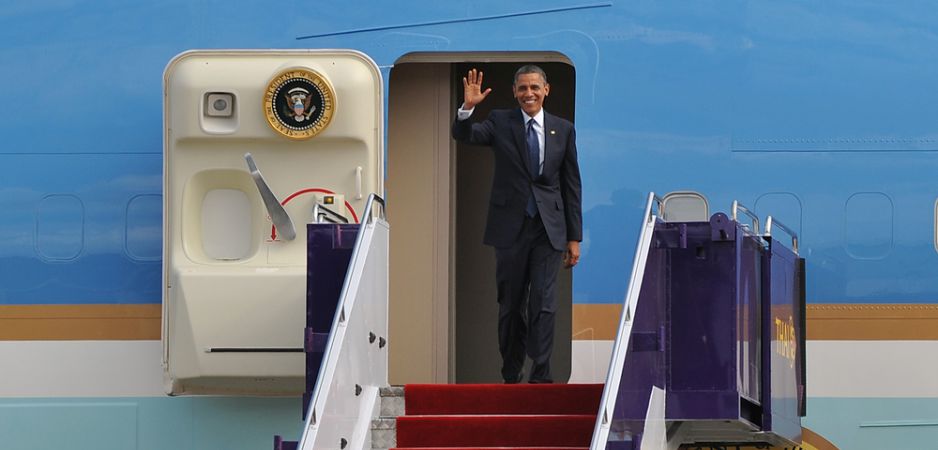Whether intentional or not, the Obama airport episode will make the US look diminished to Chinese audiences.
It was pretty humorless as diplomatic gaffes go. After touching down in China for the G20 Summit, US President Barack Obama was not provided a staircase—or the accompanying red carpet—that other world leaders were welcomed with upon arrival.
Instead, the president was forced to leave from the rear exit, or as one China expert put it, from the “ass of the plane.” American journalists also complained of China’s security forces rolling out blue tape to prevent foreign media from watching President Obama embark.
The awkwardness soon boiled into overt hostility as Chinese officials were caught yelling, “This is our country! This is our airport!” at their US counterparts who tried to fix the situation.
Why Do Diplomatic Gaffes Matter?
Does the incident matter? Yes. While the lion’s share of diplomacy is carried out in smoky rooms behind closed doors, it is also about the calculated use of symbols, rituals and ceremonies. The welcoming of a foreign guest is one of the many occasions that require a smooth undertaking. Unlike what goes on in smoky rooms, it will be viewed by millions of people.
The cosmetic side of diplomacy matters because states like to objectify their intentions through symbols and public interactions. Most usefully, it regulates the environment for world leaders participating in diplomatic practice, usually seeking to motivate or encourage them toward a preferred direction. An adversarial is likely to become more agreeable after a generous state banquet. It also allows audiences—local and abroad—to grasp the meaning of international affairs.
Few other states understand the importance of symbolism in statecraft more than China. Consider the disastrous attempt of the Macartney Mission in 1793 to establish diplomatic ties between Britain and China. The emperor refused all of Britain’s proposals after the chief British diplomat, George Macartney, refused to kowtow to his Chinese counterparts.
A happier anecdote came before Henry Kissinger’s secret visit to China in 1972. Upon realizing their airports lacked an air stair large enough for the American statesman’s Boeing 707—Chinese pilots were still using old Soviet aircraft—Chinese officials had a special stairway hastily built. Even secret meetings demanded protocol. Thus, the embarrassing prospect of Kissinger being unable to leave his plane was avoided. How times have changed.
China’s Image to the World
So far, there is no proof to suggest that Obama’s disorderly arrival was a bizarre stunt designed to undermine the US president. But there is undoubtedly some symbolism behind it. Jorge Guajardo, Mexico’s former ambassador to China, told The Guardian he was convinced Obama’s treatment was part of a calculated snub, as a result of “Chinese arrogance.”
“It’s part of stirring up Chinese nationalism. It’s part of saying: ‘China stands up to the superpower.’ It works very well with the local audience,” Guajardo said.
It would not be the first time China has tried to make itself look big on the international stage. When President Xi Jinping met Obama in Beijing during the 2014 Asia Pacific Economic Cooperation Summit, the Chinese leader stood on the right with his open hand on show to photographers. The US president was required to approach him, as if paying tribute, from the left.
Indeed, a simple image search of “Xi Jinping handshake” finds a great majority of photos using the exact same positioning: Xi on the right, receiving the handshake of an approaching foreign leader. It is a subtle expression of power, and a symbol that allows the Chinese audience to visualize international affairs in Beijing’s favor.
Whether intentional or not, the airport episode will make the US look diminished to Chinese audiences. A Chinese official was quick to point the finger at the Americans themselves, citing that the US side “complained that the driver [of the staircase] doesn’t speak English and can’t understand security instructions” before refusing the staircase outright. State-owned media—usually unabashedly nationalist in these situations—decided to downplay the episode.
The appearances were enough. The damage was already done.
The views expressed in this article are the author’s own and do not necessarily reflect Fair Observer’s editorial policy.
Photo Credit: 1000 Words / Shutterstock.com
 We bring you perspectives from around the world. Help us to inform and educate. Your donation is tax-deductible. Join over 400 people to become a donor or you could choose to be a sponsor.
We bring you perspectives from around the world. Help us to inform and educate. Your donation is tax-deductible. Join over 400 people to become a donor or you could choose to be a sponsor.
Support Fair Observer
We rely on your support for our independence, diversity and quality.
For more than 10 years, Fair Observer has been free, fair and independent. No billionaire owns us, no advertisers control us. We are a reader-supported nonprofit. Unlike many other publications, we keep our content free for readers regardless of where they live or whether they can afford to pay. We have no paywalls and no ads.
In the post-truth era of fake news, echo chambers and filter bubbles, we publish a plurality of perspectives from around the world. Anyone can publish with us, but everyone goes through a rigorous editorial process. So, you get fact-checked, well-reasoned content instead of noise.
We publish 2,500+ voices from 90+ countries. We also conduct education and training programs
on subjects ranging from digital media and journalism to writing and critical thinking. This
doesn’t come cheap. Servers, editors, trainers and web developers cost
money.
Please consider supporting us on a regular basis as a recurring donor or a
sustaining member.
Will you support FO’s journalism?
We rely on your support for our independence, diversity and quality.






